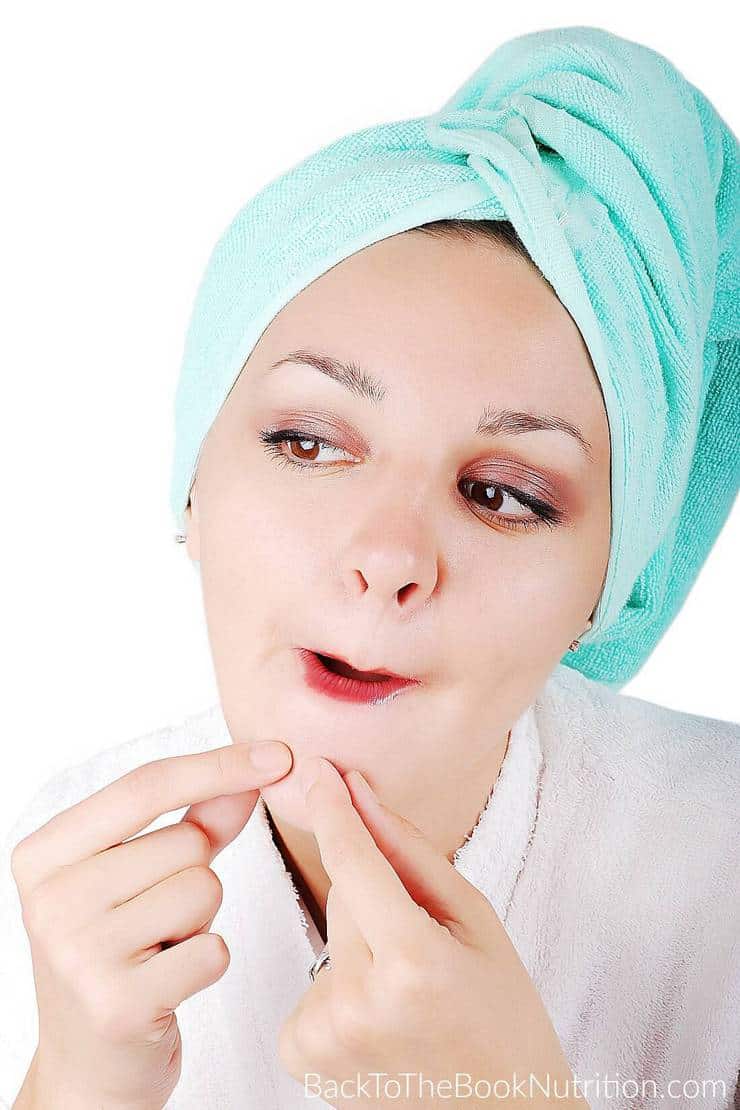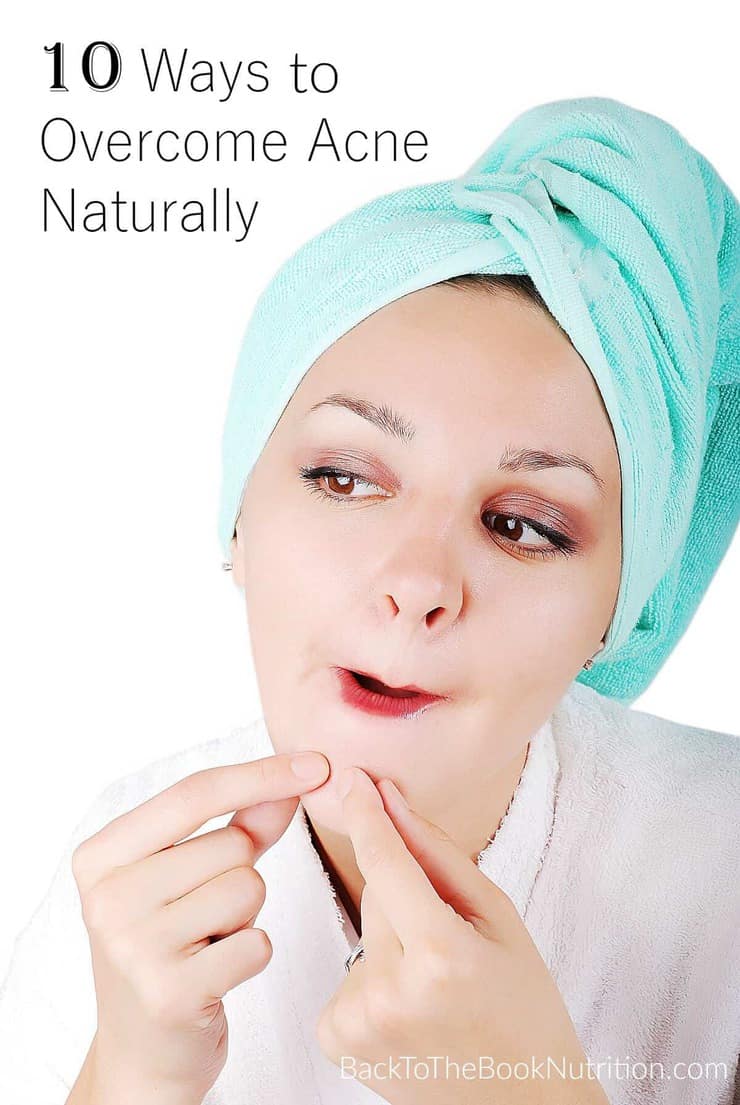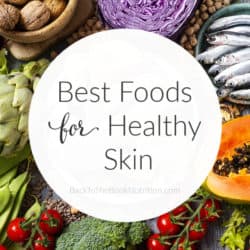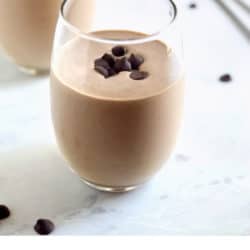Embarrassing breakouts don’t just happen to teenagers. Learn what really causes adult acne and 10 ways to overcome it naturally without medications or side effects!
Note from Dena: This guest post was written by Sarah Fennewald, Dietetic Intern, as part of a research partnership between Back To The Book Nutrition and post-graduate nutrition students from the University of Houston.
You may have heard that the skin is the largest organ of our body, and most of us know the skin has many important functions such as protecting us from dangerous bacteria and viruses. However, our skin is much more than just a barrier to keep things out – it also has the ability to absorb and bring things in.
Our skin’s appearance is also a huge part of our personal identity and, while acne and most skin conditions are not life threatening, they sure can put a damper on your self-esteem and social life.
Clearly, what’s going on with our skin relates to our overall physical and mental health, and the best way to overcome skin symptoms is by identifying and addressing the root causes of them.
WHY AM I STILL GETTING ACNE?
If you’re wondering why you’re still getting acne, you’re not alone. We may think of acne as an adolescent issue but, it is the most common skin condition in the United States, affecting around half of adult women (and fewer men). (2)
I experienced acne for the first time in my twenties, which was so frustrating. I could not figure out why I was dealing with something that was supposed to be an issue for high school students! Thankfully, my nutrition and wellness studies have helped me understand what was triggering my acne and have given me tools to overcome it!
Whether you’re frustrated by acne in your 20s, 30s, 40s, or even 50s, I hope the following information will be helpful for you too!
WHAT REALLY CAUSES ACNE?
According to the Mayo Clinic, oil production, dead skin cells, clogged pores, and bacteria are the four skin-related factors that cause acne. But these factors are usually triggered by deeper issues like hormone imbalance, chronic stress, poor gut health, and more. (3) Unfortunately, medications commonly prescribed to treat acne don’t address these root issues, and often bring with them unwanted side effects.
Hormones
As women, our hormones are often blamed when we get emotional or want chocolate. While this may not be true in every case, hormones do have an important impact on our physical and emotional health, including skin health. We all know that hormones changes and acne occur during puberty, but hormone imbalances can happen at any stage of life and for a number of reasons. For example, chronic stress, pregnancy, and illness can all affect hormone levels.
Two specific hormones have been strongly linked to acne.
- Testosterone – excess testosterone in either females (as is the case in Polycystic Ovarian Syndrome, or PCOS) or males can increase sebum (oil) production
- DHEA – higher levels of Dehydroepiandrosterone (DHEA), which can occur with HPA axis dysregulation (aka: adrenal fatigue), can increase acne
Interestingly, conditions of estrogen excess (PMS, endometriosis, fibroids, etc.) can sometimes trigger acne as well.
Stress + Inflammation
Chronic stress from a variety of sources can promote inflammation, leading to hormone imbalances, nutrient deficiencies, gut imbalances, acne, and more.
- Physical stress (excessive exercise, busyness, illness, gut infections, etc.)
- Mental stress (pressure to perform at work/school, anxiety, depression)
- Emotional stress (life events, whether happy or sad – weddings, promotions, deaths, relational strain, etc.)
- Dietary stress (diet high in processed foods and sugars)
- Environmental stress (exposure to toxins and pollutants)
Medications
Several types of prescription medications can make acne worse. Unfortunately, acne is only the tip of the iceberg with these – other long term consequences like poor gut health, fertility challenges, and immune/auto-immune challenges are common as well. (11)
- Birth control medications and devices
- Corticosteroids (Dexamethasone, etc.)
- Antidepressants
Acne Promoting Foods
In the past medical professionals denied a connection between acne and diet, but more recent research has proven that certain foods are connected to acne, including the following. (5, 6, 7)
- Sugar
- Refined Carbohydrates (such as white flour, white rice, packaged cereal, etc.)
- Dairy
Nutrient Deficiencies
Acne has also been linked to inadequate levels of certain micronutrients such as the vitamins and minerals listed below, as well as others. (4, 10)
- Zinc
- Magnesium
- Selenium
- Vitamin A
- Vitamin D
- Vitamin E
Poor Gut Health
You are probably not surprised to learn that there is a strong connection between gut health and skin health. Several gut problems are associated with acne and other skin disorders. (12)
- Dysbiosis
- Leaky gut
- Rosacea
- SIBO
- Yeast overgrowth
Now that we know what triggers acne, let’s look at some simple strategies to eliminate it!
10 STEPS TO OVERCOME ACNE NATURALLY
1. Cut back on sugar (aka: choose low glycemic foods)
The glycemic index considers how many carbohydrates are consumed and how quickly those carbohydrates are absorbed into the blood. Foods like sugar and refined (white) flours abundant in the typical Western diet have a high glycemic index, leading to higher blood sugar and insulin.
This increases inflammation and can lead to overproduction of androgens like testosterone. As mentioned earlier, an imbalance of testosterone and estrogen can result in more oily secretions in the skin. (5, 6, 7)
Lower glycemic foods include:
- Vegetables
- Nuts
- Eggs
- Pastured animal meats
- Wild caught seafood
- Unprocessed grains (oats, barley, etc.)
- Legumes
Bottom Line: Replace sugar (including natural sweeteners) and processed foods in your diet with real, whole foods.
2. Go Dairy Free
Milk is another food associated with acne. It is believed that the constituent of milk that causes acne is a hormone, insulin-like growth factor 1 (IGF-1), that is produced by cows during pregnancy. In addition, acne is absent in non-westernized populations that do not consume milk or dairy (5,6)
Bottom Line: Cutting out dairy may greatly improve acne.
3. Eat Anti-Inflammatory Foods
Adult acne is more likely to be inflammatory than teenage breakouts. (2)
A high intake of omega-3 fatty acids from marine foods and anti-inflammatory phytochemicals from various plant foods can inhibit the production of proinflammatory cytokines, which can have a therapeutic effect on acne.
- Wild-caught fish including salmon, mackerel, and tuna
- High quality cod liver oil
- Green leafy vegetables
- Red and dark purple plant foods such as berries, eggplants, beets, red bell peppers, etc.
- Turmeric/curcumin
- Ginger
- Green tea
Currently, most westerners consume too little of the omega-3 foods above and far too much omega-6 (largely found in commercial vegetable oils and packaged foods), which creates stress and inflammation. In addition to increasing omega-3’s, aim to reduce intake of omega-6’s. (4, 6)
Bottom Line: Eat anti-inflammatory foods daily and reduce intake of pro-inflammatory processed foods.
4. Correct Nutritional Deficiencies
Vitamins A and E, Zinc, and Selenium all play a role in the proper growth and immunity of the skin and may be valuable in acne treatment. In fact, individuals with acne often have lower blood levels, or are deficient, in one or more of these nutrients. (6)
Food sources of these nutrients include:
- Vitamin A – liver, cod liver oil
- Vitamin E – almonds, spinach, avocados
- Zinc – pastured animal meats, shellfish, pumpkin seeds
- Selenium – brazil nuts, fish including cod, tuna, and salmon
If you suspect these or other deficiencies, a simple blood test can help measure your levels of a wide range of vitamins and minerals, as well as antioxidant activity and immune function. Insurance coverage is sometimes available to help with the cost. Schedule a free 10 minute Discovery Call with Dena to learn more about Holistic Nutrition Coaching and nutrient testing!
Bottom Line: It is best to eat a nutrient-dense whole foods diet rich in fruits, vegetables, and pastured animal products to obtain these vitamins and minerals.
5. Improve Gut Health
The integrity of the gastrointestinal tract is a contributing factor to acne and gut microbes may influence the degree of acne by influencing inflammation, oxidative stress, glycemic control, and pathogenic bacteria. (4, 8)
- Include cultured and fermented foods rich in probiotics
- Consider taking a high quality probiotic supplement
- Eat a plant-rich diet with plenty of fruits, vegetables, beans, legumes, and nuts
- Identify and eliminate any gut pathogens or infections with the help of a holistic practitioner.
Bottom Line: Gut health is directly linked to skin health and acne is unlikely to resolve completely until gut health is addressed.
6. Reduce Stress
Stress is highly inflammatory and managing stress is critical for optimal health, especially with the demands of our western lifestyle. Remember that “stress” refers to anything – whether mental, emotional, physical, that puts strain on our bodies.
- Incorporate daily relaxation practices
- Journaling
- Prioritize laughter and fun
- Address infections, gut dysbiosis, food sensitivities, and other physical stressors
Bottom Line: Incorporate stress reducing practices daily.
7. Sleep
Sleep is often the first thing to go when we want or need to get more done. But short-cutting our sleep is detrimental for hormone balance and overall health. Most of us need at least 7 hours of good quality sleep each night.
Ideally, turn off all screens and artificial lights within an hour of going to bed, and be asleep before 10pm. These basic steps help support adequate melatonin production, which is intricately involved in hormone balance. Read more in this 2-part blog series titled, All About Sleep.
Bottom Line: Don’t skimp on sleep!
8. Exercise
Your exercise routine should be challenging, but not depleting so that you sleep better and have more energy overall.
If you exercise intensely most days of the week and are experiencing acne, severe fatigue, and/or altered menstrual cycles, something deeper like HPA-D (aka: adrenal fatigue) may be at play. Consider exercising less – not more – until you’ve identified and fully recovered from this or other root health issues.
Bottom Line: Get regular exercise, but don’t overdo it.
9. Keep a Symptom Diary
Everyone may not respond the same to each of these solutions depending on the root cause of acne. Keep track of what you eat each day and which dietary factors seem to make your acne better or worse. You can also record exercise, stress levels, and sleep to determine its effect on your skin.
Bottom Line: Keep track of how your skin is reacting to various foods and lifestyle patterns.
10. Switch to Natural Makeup + Skin Care Products
It’s estimated that over 12 million adults are applying chemicals to their bodies every single day that are classified as probable or known carcinogens. And it’s not to mention daily exposure to chemicals that are probable or known disrupters to fertility and fetal development. Sadly, many people have no idea that what they’re putting on their skin and hair is harming their health.
Bottom Line: Pay attention to what you put on your skin and hair. Replace traditional products with more natural options to minimize toxic load.
WANT A PERSONALIZED PLAN TO OVERCOME ACNE?
A nutrient-dense, whole foods diet accompanied by stress management, physical activity, and adequate sleep are all crucial for healthy skin. If you’re doing all these things and still need help overcoming acne, Holistic Nutrition Coaching can help you get to the bottom of root health issues and create a personalized plan to overcome acne and other symptoms for good!
You might enjoy these other posts related to skin health!
Best Foods for Healthy Skin
Best Natural Tips for Healthy Skin
Chocolate Protein Shake for Healthy Skin
About the author: Sarah Fennewald is currently a Dietetic Intern at the University of Houston. She completed her B.S. in Dietetics at Fontbonne University in St. Louis, Missouri. Her goal is to use her nutrition knowledge to empower individuals to make real life changes that will improve their quality of life.
Disclaimer: Information on this site is intended only for informational purposes and is not a substitute for medical advice. Always consult with a trusted healthcare provider before implementing significant dietary change. Read additional disclaimer info here.
References
- Lim, H. W., Collins, S. A., Resneck, J. S., Bolognia, J. L., Hodge, J. A., Rohrer, T. A., … & Nerenz, D. R. (2017). The burden of skin disease in the United States. Journal of the American Academy of Dermatology.
- Rocha, M. A. & Bagatin, E. (2018). Adult-onset acne: prevalence, impact, and management challenges. Retrieved from: https://www.ncbi.nlm.nih.gov/pmc/articles/PMC5798558/
- Mayo Clinic. (2015). Diseases and condition: Acne. Retrieved from http://www.mayoclinic.org/diseases-conditions/acne/basics/definition/con-20020580
- Hyman, M. (2015). 10 simple strategies to eliminate acne. Retrieved from http://drhyman.com/blog/2015/11/04/10-simple-strategies-to-eliminate-acne/
- Fiedler, F., Stangl, G. I., Fiedler, E., & Taube, K. M. (2016). Acne and Nutrition: A Systematic Review. Acta dermato-venereologica.
- Kucharska, A., Szmurło, A., & Sińska, B. (2016). Significance of diet in treated and untreated acne vulgaris. Advances in Dermatology and Allergology, 2, 81-86.
- Katta, R., & Desai, S. P. (2014). Diet and dermatology: the role of dietary intervention in skin disease. The Journal of clinical and aesthetic dermatology, 7(7), 46.
- Bowe, W. P., & Logan, A. C. (2011). Acne vulgaris, probiotics and the gut-brain-skin axis-back to the future?. Gut pathogens, 3(1), 1.
- Kim, J., Ko, Y., Park, Y. K., Kim, N. I., Ha, W. K., & Cho, Y. (2010). Dietary effect of lactoferrin-enriched fermented milk on skin surface lipid and clinical improvement of acne vulgaris. Nutrition, 26(9), 902-909.
- Pappas, A. (2009). The Relationship of Diet and Acne. Dermatoendocrinology, 1(2): 262-267.
- Kazandjieva, J., & Tsankov, N. (2017). Drug-induced acne. Clinics in Dermatology, 35(2), 156-162.
- Kresser, C. (n.d.). Nutrition for Healthy Skin. Retrieved from http://my.chriskresser.com/ebook/nutrition-for-healthy-skin/







I apply dermalmd blemish serum every night after I shower. The only thing that worked for me. Ive dealt with adult acne for years. Takes about a couple of weeks to start working when you first give it a try. One bottle lasts me about 4 months
In my case it was PCOS. I finally found out at 39. Needed medication to help control it. Now I’m working on removing the scars with microneedling. Very hard to be dealing with acne in our 30s and 40s. Thanks for the tips.
PCOS can definitely be challenging, but I’m glad to hear you got the diagnosis and are finding helpful solutions!
ah there’s a few things I had never knew that could cause acne. this was definitely a very insightful post. I’ve never really had acne myself so this was knew to me
Glad you enjoyed it, Nicol!
Yeah it’s funny how adults could have acne too when it’s really a problem just for teens. But i also had the same experience, i also had an acne breakout and my conclusion was it is my make up routine that triggers it.
Make up definitely makes a difference!
Breaking out during the holidays due to the stress. This isn’t fun, but you’re right, there are a variety of reasons why you would break out.
Thanks for sharing this informative one, really useful. Gonna explore it myself for pretty skin
cheers, siennylovesdrawing
Thank you for this, my skin has been breaking out SO badly lately with the weather changes!
Glad to help!
Fab tips here! Drinking plenty of water seems to help the overall look of my skin and trying to limit the amount of sugary food that I eat. 🙂
Those are great tips, Jayne! )
Eating clean worked wonders for me. These are all great way to overcome acne. Thanks for sharing.
Hi.
Acne can be such a huge problem for a teenager (and not only for a teenager). My son isn’t n that fase yeath but, i will save this ideas for when i need it. Great post